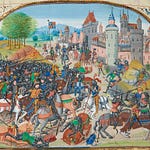Originally published on February 20, 2023 (Episode 304)
Introduction
“At the start of the twelfth century,” writes Rowan Dorin, “western European rulers almost never resorted to the collective expulsions of wrongdoers from their domains; ecclesiastical authorities evinced little concern about the Jewish communities living under Christian rule; and the church’s efforts to repress usury focused largely on clerics who engaged in money lending. By the late thirteenth century, expulsion had become a recurring tool of royal governance in both England and France; bishops across Latin Christendom were advocating for harsh restrictions on Jewish life; and Popes, theologians, and canon lawyers had recast usury as menacing the whole of society…”
Why and how this dramatic transformation occurred is the focus of Dorin’s No Return: Jews, Christian Usurers, and the Spread of Mass Expulsion in Medieval Europe (Princeton University Press, 2023). In our conversation, he explains how legal thought, royal policy, and religious anxiety converged to make mass expulsion a normalized practice—and how this history reverberates into the present, when expulsion remains a tool in the arsenal of governments.
About the Guest
Rowan Dorin is Assistant Professor of History at Stanford University. No Return is his first book.
For Further Investigation
Selections and recommendations by Rowan Dorin
Robert Chazan, Refugees or Migrants: Pre-Modern Jewish Population Movement (2018) — “A wonderfully readable overview of Jewish migrations during antiquity and the Middle Ages that overturns many widespread assumptions about the dynamics of the Jewish diaspora.”
Benjamin Z. Kedar, “Expulsion as an Issue of World History,” Journal of World History 7, no. 2 (1996), 165–180 — “A provocative and insightful article that outlines the emergence of mass expulsion as a historical phenomenon.”
R. I. Moore, The Formation of a Persecuting Society: Authority and Deviance in Western Europe, 950–1250 (1987; 2nd ed. 2007) — “The book that launched a thousand dissertations—still essential reading for anyone interested in how medieval authorities came to see deviance as dangerous.”
Jacques Le Goff, Your Money or Your Life: Economy and Religion in the Middle Ages, trans. Patricia Ranum (1988) — “A brilliant account of the growing concern with usury and moneylending in medieval Europe, written by one of the twentieth century’s greatest historians.”
Miri Rubin, Cities of Strangers: Making Lives in Medieval Europe (Cambridge, 2020) — “For anyone wondering what life was like for foreigners or Jews living in a medieval city, this collection of lectures is the place to start.”
Daniel Lord Smail, Legal Plunder: Households and Debt Collection in Late Medieval Europe (Harvard, 2016) — “A wide-ranging exploration of debt and debt collection in the medieval Mediterranean world.”
Francesca Trivellato, The Promise and Peril of Credit: What a Forgotten Legend about Jews and Finance Tells Us about the Making of European Commercial Society (Princeton, 2019) — “The histories of Jews and Lombards continued to be intertwined even after the Middle Ages, as Trivellato shows in this masterful study of early modern commercial culture.”
💬 Listen & Discuss
How should we think about expulsion as a political tool? Was it primarily religious, legal, or economic in origin? Share your reflections in the comments—and pass this episode along to anyone interested in medieval Europe or the history of intolerance.











